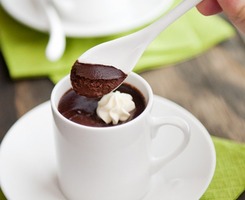英國口語、俚語實用寶典
雅思考試是英國劍橋大學委員會和澳洲idp共同舉辦實施的國際英語語言測試系統(tǒng),筆者收集了諸多英國地道口語,喜歡英音(英倫腔)的各位朋友,可以來看看,希望可以幫到大家。
1.beat a dead horse 白費勁
2.The sky's the limit. 沒有限制
3.once in a blue moon 千載難逢;難得一次
4. Beprepared. 準備好
5.It's easier said than done. 說的比做的簡單
6.have second thoughts 考慮一下;猶豫
7.behind someone's back 在某人背后;背著某人
8.Better luck next time. 下次運氣更好
9.come in handy 派得上用場
10.rain cats and dogs 傾盆大雨
11.First come,first served. 先來先招待;捷足先登。
12.It's not myday! 今天運氣真糟
13.That's news to me. 這可是新聞呢
14.There's no way to tell. 沒辦法知道
15.read sb.like an open book 清楚某人心里的想法
16.You've got me there. 你考到我了
17.Easy does it. 慢慢來;小心一點;別生氣了
18.on the tip of one's tongue 差一點就說出口;差一點就記起來的
19.The more,the merrier. 越多越好
20.let someone off the hook 讓某人擺脫麻煩、解脫困境
21. besidethe point 離題的;不是重點
22.burn the candle at both ends 白天晚上都要忙;花費很多精力
23.meet a deadline 截稿
24.out of sight, out of mind 眼不見為凈;離久情疏
25.rub someone the wrong way 惹惱某人
【打招呼、感謝】
Alright? – Hello. How are you? 你好
Hiya, Aye up – These informal greetings both mean Hello and are especiallypopular in the north of England. The aye is pronounced like the letter A.這兩種非正式的打招呼用法,都是"你好"的意思,在英格蘭北部非常流行。其中"aye"發(fā)音與字母"A"同。
Howay – Let's go or Come on. 走吧
Ta – Thank you 謝謝
Cheers – This is usually said as a toast when you raise your glasses to celebrate, but it also means Thank you.這個詞通常在舉杯祝酒的時候說,但也可以表示謝謝。
【人的稱呼】
Bairn – Baby or young child 小孩子
Lad – Boy 男孩
Lass, Lassie – Girl 女孩
Bloke, Chap – Man 男人
Mate, Pal – Friend 朋友、伙計
Our kid – My brother or my sister 我的兄弟或姐妹
Don't be confused if someone calls you pet, duck, sweetie, love, chicken, chuck, chucky-egg or sunshine. People in the UK often use these terms when they are addressing other people as a sign of friendliness and affection.
It is usually not appropriatefor younger people to use these terms with older people, however.如果有人叫你pet、duck、sweetie、love、chicken、chuck、chucky-egg或sunshine,不要覺得奇怪,英國人喜歡用這些昵稱來表達友好和喜愛之情。不過年輕人這樣稱呼長輩就有些不妥。
【社交、約會】
Do – Party. You would go to a do if you were going to a party in the UK.派對、聚會。在英國,參加派對就是"go to a do".
BYOB – Bring your own bottle. In the UK, it is common for the party host to ask guests to bring their own drinks. You might see BYOB written on theinvitation.
自帶酒水。在英國,派對的組織者通常會讓客人自帶酒水,你可能在請?zhí)峡吹紹YOB這個詞。
Cuppa – Cup of tea 一杯茶
Pissed – Americans may think this means upset. But in the UK it is theequivalent of being drunk.
美國人可能認為這個詞表示心煩不高興,但在英國這個詞是喝醉了的意思。
E.g., "Is he pissed?"他是不是喝醉了?
Fancy – To find someone attractive 覺得某人迷人。
E.g., "He just smiled. I think he fancies you!"他剛笑了。我覺得他喜歡你。
Ask out – To ask someone if they want to go on a date 邀請某人外出約會。
E.g., "He asked me out! We're going to the cinema this Friday."
他約我了!我們周五要去看電影。
Chat up – To flirt with someone 和某人調情。
E.g., "He was chatting me up at the party."派對上他一直在跟我搭訕。
Snog – To kiss passionately 熱吻。
E.g., "My dad and mum were snogging at their anniversary party. I didn't know where to look.
"爸媽在結婚周年紀念上熱吻,我都不知道該往哪兒看了。
Chin-wag – Talk or gossip with friends 和朋友閑聊、八卦
E.g., "Fancy a chin-wag?"想聊聊嗎?
【金錢】
Quid – Equal to £1. The word doesn't change in the plural, so £50 is fifty quid.一英鎊。這個詞沒有復數(shù)形式,所以50英鎊就是fifty quid。
Skint, Broke – Poor or lacking money 很窮、沒錢
E.g. "I can't come to the restaurant as I'm skint this week."我不能下館子,本周是窮光蛋一個。
Minted, Rolling in it – Rich 有錢
E.g. "It was my birthday last week and I got some money off my family, so I am minted now!"上周我過生日,家里人給了些錢,我現(xiàn)在發(fā)達了。
Splashing out – Spending a lot of money 花大筆錢
That's as cheap as chips – That is very cheap 非常便宜
That costs a bomb – That is too expensive 太貴了
That's a rip-off – That is not worth the price 搶錢呢吧
Cough up! – Pay your share of the bill! 快掏錢付你自己那份賬單!
【物品】
Brolly – Umbrella 雨傘
Telly – Television. Some people also say "What's on the box?" to mean "What's on TV?"電視。一些人也說"What's on the box?",表示電視上在演什么。
Loo – Toilet 廁所
Mobile – Mobile telephone. It is unusual to say cellphone in the UK.手機。在英國說cellphone會很奇怪。
【強調、感嘆】
Bloody – One of the most useful swear words in British English. Mostly usedas an exclamation of surprise e.g. "bloody hell".Something may be "bloody marvelous" or "bloody awful". It is also used to emphasize almost anything, e.g. "you're bloody mad", "not bloody likely".
英國英語里最有用的臟話。多用于表達驚訝之情,如bloody hell(該死、見鬼、我的天)。某事物可以是bloody marvelous(超贊的),也可以是bloody awful(糟糕透了)。它還以用來強調幾乎任何事情,如you're bloody mad(你簡直瘋了)、not bloody likely(沒門兒)。
In the UK, you may hear people use the slang terms."well", "dead" or "mega" instead of"very" or "really". For example, "It was dead good" or "That exam was well difficult!"
在英國,你可能會聽見人們使用俚語用法的well、dead、mega來代替very或者really。如It was dead good(棒極了),或That exam was well difficult.(考試好難。)
英國英格蘭地區(qū)常見口語總結
1. Au fait – this is an example of a French expression that has become part of the English Language. It means to have good detailed knowledge of something. (This is not slang but a very British English expression.)
Au fait –這本來是法語短語,現(xiàn)在成了英語中的一部分。它的意思是對某事物有非常細致的了解。(它不是俚語卻是非常地道的英式表達)
“She is au fait with the company’s rules and regulations.”
她對公司的規(guī)章制度熟悉,了然于心。
2. Blinding – if something is blinding, it means that it’s excellent.
Blingding—如果某事物是亮瞎眼的,它的意思就是非常棒、非常出色。
“She makes a blinding roast dinner”
“她做了一頓很棒的美味無比的燒烤晚餐。”
3. Bugger all – if you’ve got bugger all for dinner, it means you have nothing. (This is an impolite expression so use it with caution)
Bugger all –如果你說晚餐吃個屁,那就是說你什么也沒有。(這種表達十分不禮貌需慎用)
“I worked 7 hours on that job and I got bugger all thanks for my efforts”.
“我花了七個小時處理那項工作,但我的努力卻連個謝謝都沒撈到。”
4. Cock Up – This can be used as a verb or a noun and it means to make a serious mistake or a mistake. (It has nothing to do with male parts!)
Cock Up –這個俚語既可用作動詞也可用作名詞,它的意思是犯了很嚴重的錯誤或犯錯誤。(這個表達跟男性器官毫無關系。)
“You really cocked up this time. What are you going to do?”
“這次真是搞得一團糟,你想干什么?”
5. Donkeys’ years – a long time or ages
Donkeys’ years –很久很久,好多年。
“It was so great to see Sally again. I hadn’t seen her in donkey’s years.”
“非常高興再次見到薩利,我好多年沒有見到她了。”
6. Gobsmacked - “Gob” is mouth is British English and if you smack it, you probably would do it because you are amazed or shocked.
Gobsmacked –“Gob”是嘴巴的意思,是英式英語,如果你用這個表達“smack it”因為你被震驚到了,所以你可能會張大嘴巴。
“I was gobsmacked by how much weight Pete had lost”.
“皮特瘦了這么多,真讓我太吃驚了!”
7. Gormless – another way to say vacant or clueless.
Gormless –另一種表示茫然或無頭緒的方式。
Mr Bean’s gormless look.
憨豆先生看起來很憨很萌。
“She always has a gormless look in meetings.”
“開會她總是一副一臉茫然的表情。”
8. Gutted – really upset. Gutted –非常不安
“I was gutted when I didn’t get the job”.
“沒得到這份工作,我心煩意亂。”
9. Hunky-dory – fine, going well,
Hunky-dory –很好,進展順利。
“How are things with you?”
“最近怎么樣?”
“Everything is hunky-dory,thanks.”
“一切都挺好的,謝謝.”
10. Knackered – very tired, exhausted
Knackered –非常累,精疲力竭
“I’ve been working for hours onthis report. I’m knackered“.
“我花了幾個小時做這個報告,已經(jīng)累趴下了.”
11. Lurgy – if you’ve got the lurgy, it means you are ill with the flu or a virus. It means that people will stay away from you.
Lurgy –如果你得了傳染病,也就是感冒了或者帶了其他病毒。這就意味著人們會和你隔離遠離你。
“Where’s Sarah today?”
“薩拉今天去哪里了?”
“She’s off sick. She’s got the lurgy“.
“她生病了,被隔離了。”
12. Nice one! – If someone is impressed by what you’ve done, they could use this expression. It’s similar to “good job” in American English. It canalso be used sarcastically.
Nice one! –如果一個人對你所做的事情印象深刻,他們就能用這個表達方式。它同美式英語里的“干得好”同義,也可以用于帶有諷刺意味的夸獎。
“I managed to get two tickets for the One Direction concert at the O2 arena”. “Nice one, mate!“
“我設法弄到了兩張One Direction音樂會的票,在O2舞臺。”“伙計,這真棒。“
文章來源于網(wǎng)絡,如有侵權請聯(lián)系我們,將會在第一時間處理
更多資訊可以關注微信公眾號:IELTSIM。
[AD] 點擊此處了解【雅思合集】【學習計劃定制】【終生VIP服務】












